calsfoundation@cals.org
Atkins Pickle Company
Atkins Pickle Company was the major industry in the town of Atkins (Pope County) for more than fifty years, and its legacy survives in the annual Picklefest celebration that began in 1992. The building that housed the pickle plant now houses Atkins Prepared Foods. The new company employs more people than the pickle plant did at its end, but it does not provide the same level of recognition for the town once dubbed the “Pickle Capital of the World” and known as the home of the fried dill pickle.
In 1946, a group of citizens led by Lee Cheek raised $17,000 for a loan to the Goldsmith Pickle Company of Chicago, which had agreed to invest $75,000 of its money if $15,000 was raised locally. The company purchased land and erected two buildings. The original facility also contained fifty-seven wooden tanks with a storage capacity of 1,000 bushels each. On July 17, 1946, a test run was made, and the Atkins Pickle Company plant began full operations a few days later with approximately 100 employees. The payroll had increased to 150 by August. The plant grew during the next two years. With W. W. Daugherty as field representative, the plant had contracts with 821 farmers for 1,200 acres of cucumbers. Roy Taylor, a vocational agriculture teacher, succeeded Daugherty as field manager in 1951 and continued in the position for several years.
When the plant failed to make a profit during its first two years, Goldsmith sold it to a group of Arkansas businessmen, including C. Hamilton Moses and Virgil Jackson, both of Little Rock (Pulaski County), and William Forrest Lemley of Russellville (Pope County). On February 28, 1951, it was purchased by a group headed by E. G. Watkins of Little Rock and his wife, who hired Robert Switzer as chemist. He developed many of the products that were important for the company’s growth. He developed pickled baby tomatoes, called “Tomolives,” and formulated the improved taste and crispness of fresh-pack sweet and dill pickles.
Several other ownership changes came during the 1950s and 1960s, until sales reached $2.4 million in 1962 and totaled $3.1 million by 1966. Switzer resigned in 1968 to organize a pickle company in New Mexico. Russell Dilks, who joined the company in 1964, was credited with improving sales techniques and the appearance of products. During the 1960s and 1970s, the company continued to buy products from small growers in Arkansas, Mississippi, and Texas, including some grown at the state prison farms. It had sales of $5 million, with major markets in Arkansas, Texas, Missouri, Tennessee, and Colorado.
During the early years, the plant produced specialty items such as Tomolives, as well as pickled okra, peppers, and onions. Gift packs of these items were given to dignitaries visiting Arkansas. However, after Dean Foods bought the plant in 1983, it shifted production to varieties of pickles that could be mass produced, and sales soon reached more than $40 million. Employment was 400 to 500 during the early fresh-pack seasons. In 1992, the Atkins Picklefest was inaugurated, with the pickle plant being a major contributor and providing all the pickles as well as tours of the plant.
Dean Foods closed the plant in 2002 in the midst of a flooded market. Another factor in the plant’s closure was the purchase of Dean by Suiza Corporation. The company retained the Atkins trademark at first but has since discontinued its use. In 2004, the plant was turned over to Atkins Prepared Foods, a chicken processing plant.
For additional information:
Stewart, Shea. “What’s in a Pickle?” Arkansas Life (August 2014): pp. 85–87. Online at http://arkansaslife.com/whats-in-a-pickle/ (accessed September 8, 2022).
Tyson, Van A. “It Was a Going Jessie: Atkins Pickle Plant Manager for 19 Years Reflects on Its History.” Picklefest Supplement to Atkins Chronicle. May 14, 2002, p. 11.
———. “Switzer a Major Factor in the Atkins Pickle Development.” Picklefest Supplement to Atkins Chronicle. May 15, 2002, p. 16.
———. “Waiting for the Last Jar.” Picklefest supplement to Atkins Chronicle. May 15, 2002, p. 5.
“Welcome to Picklefest 2002.” Supplement to Atkins Chronicle. May 15, 2002.
Van A. Tyson
The Atkins Chronicle

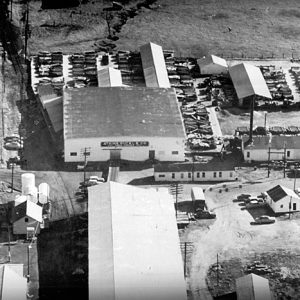 Atkins Pickle Company; 1950s
Atkins Pickle Company; 1950s 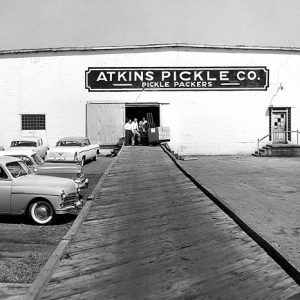 Atkins Pickle Company; 1955
Atkins Pickle Company; 1955 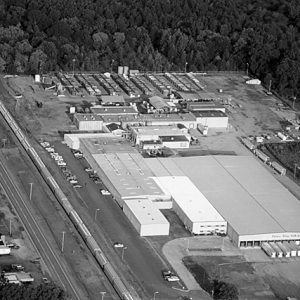 Atkins Pickle Company; 1990s
Atkins Pickle Company; 1990s 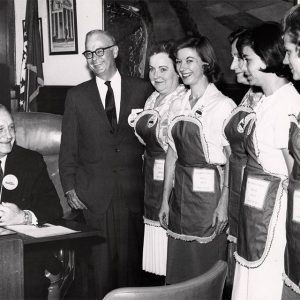 Atkins Staff
Atkins Staff 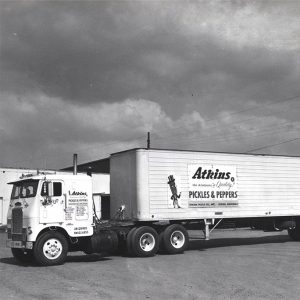 Atkins Truck
Atkins Truck 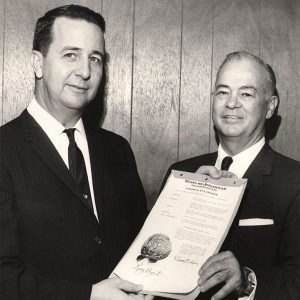 Carl Hall
Carl Hall 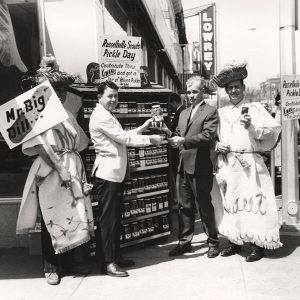 Mr. Big Dill
Mr. Big Dill 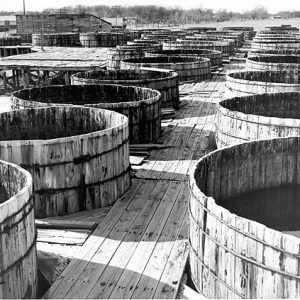 Pickle Barrels; 1955
Pickle Barrels; 1955 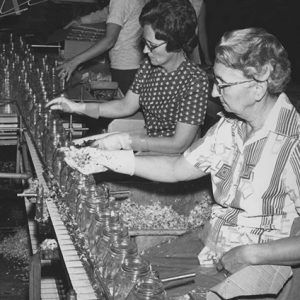 Pickle Factory Workers
Pickle Factory Workers 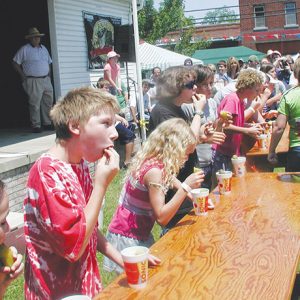 Pickle-Eating Contest at Atkins Pickle Festival
Pickle-Eating Contest at Atkins Pickle Festival 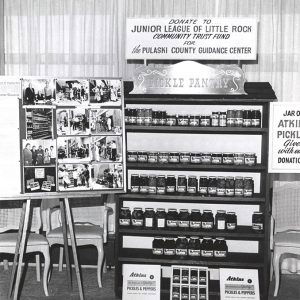 Pickles Fundraiser
Pickles Fundraiser 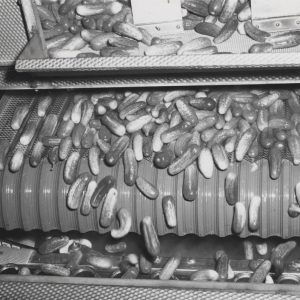 Processing Pickles
Processing Pickles 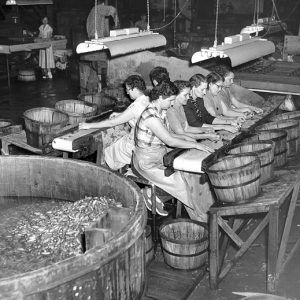 Sorting Pickles; 1955
Sorting Pickles; 1955 



Atkins dill pickles were the best! They stayed crispy and fresh for months after opening, a lost art…or maybe that’s on purpose! Maybe they stayed fresh and tasty so long that there weren’t enough sales? Who knows why Dean’s Foods closed them down, maybe because something that perfect was supposed to start in California. 😂
I lived in Arkansas for forty years and always purchased Atkins Polish Pickles. In Iowa I have not found any pickles as good as Atkins Polish Pickles. Do you know where I can find pickles as good as these? Is there a company that makes pickles with the same recipes as Atkins?
I learned to love the Atkins pickle when I came to visit my sister in Clarksville. I always purchased from three to six gallons to bring home. I did not want to run out before my next trip to Arkansas. When the Atkins plant closed, I mourned the passing of a wonderful dill pickle. I have not had a good dill pickle since that plant closing. The only kind of dill pickle in Springfield is a kosher pickle, and I can’t stand a kosher pickle.
I worked here for my first job ever. It was a summer job. The first summer, I was netting pickles primarily. I did the five-gallon room my first day and was overwhelmed. I was shocked, then with my first paycheck, I was pleased. Summer two: coordinator Susie Sills was working. They had me doing the topping one day, and she asked me if I liked it. So that was what I did that summer. The memories are not forgotten. Pickle Pride!!
I was born in Caraway; Grand-dad’s place was in Black Oak across from the A.W. Root Beer. Been eatin’ Atkins pickles since 1954. We moved to the Ozarks, and PaPa would drive to Atkins and buy a case of Dills, Hot Dills, and Sweets three times a year just for the family.